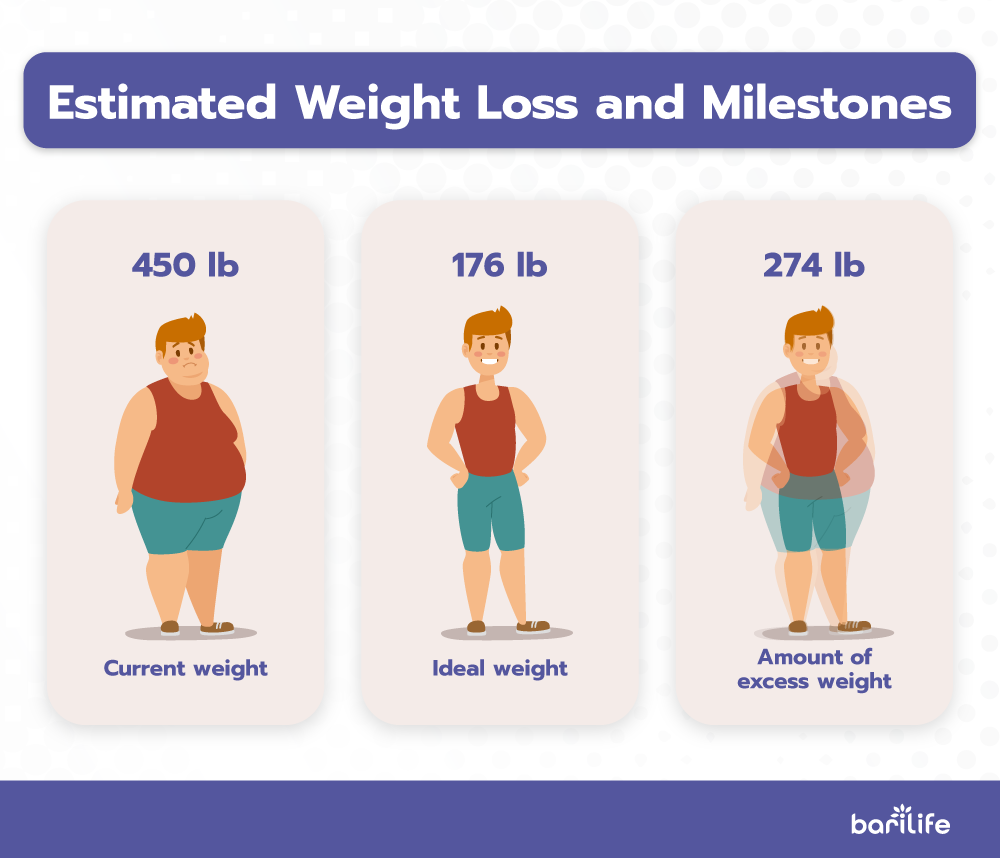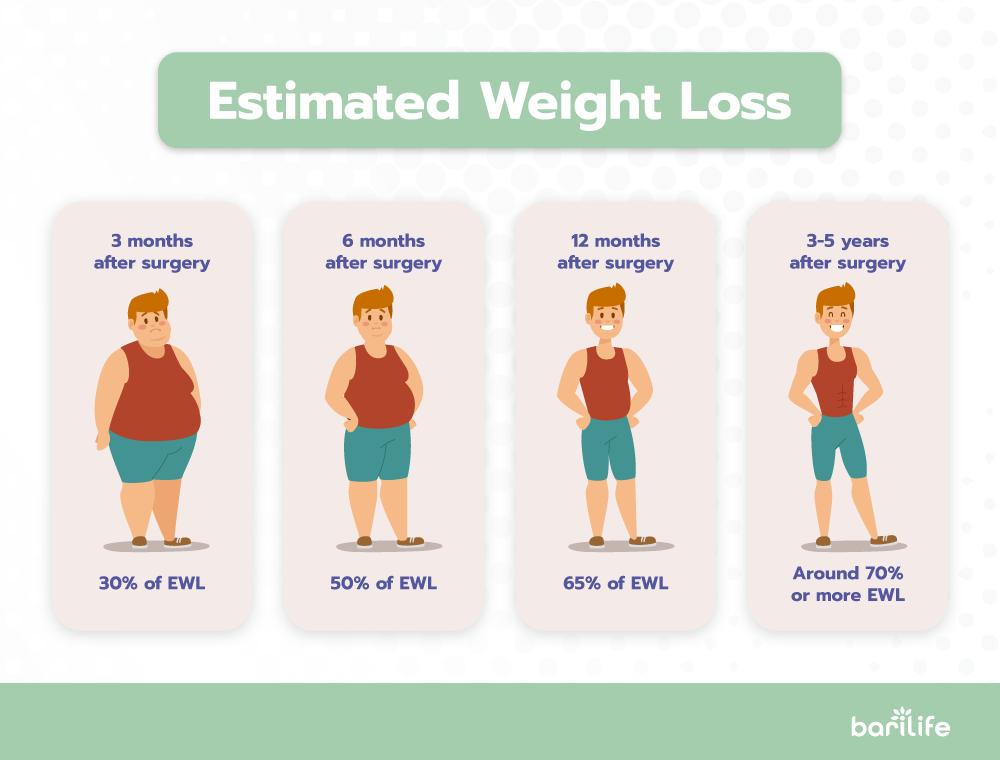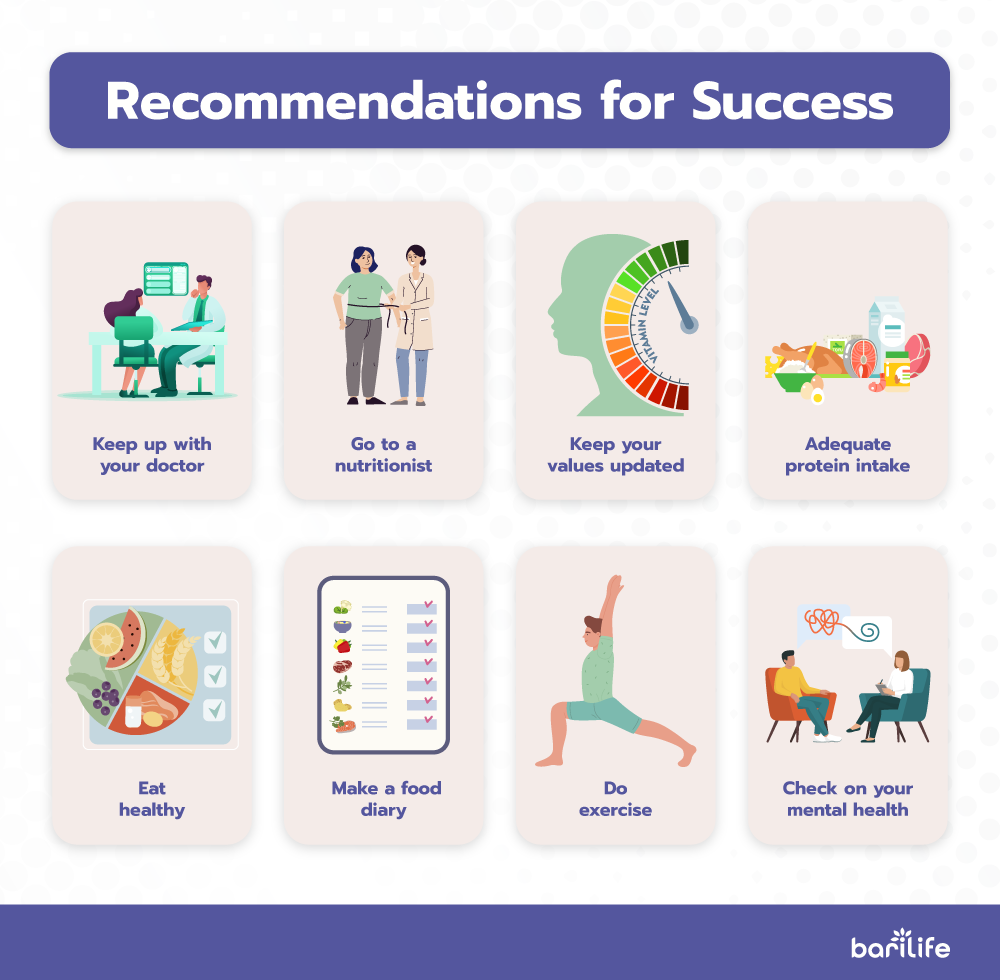Approximately 580,000 people per year have bariatric surgery. Gastric bypass surgery, also known as Roux-en-Y (RYGB), has one of the highest success rates of all bariatric surgeries. However, many post gastric bypass surgery patients experience weight regain, especially around the 10-year mark. Let’s review the basics of gastric bypass surgery, some recommendations for a gastric bypass diet 10 years later, and tips for maintaining a healthy lifestyle.
Gastric Bypass Surgery Basics
Gastric bypass surgery involves taking a small portion of your stomach and creating a new small pouch for food to pass. The new pouch is also rerouted and attached to a different section of your small intestine.
Gastric bypass surgery leads to weight loss in two different ways, which include food restriction and decreasing food and nutrient absorption. Food restriction is obtained by creating a new, smaller stomach which restricts your food intake. Thus, gastric bypass patients will reach satiety (feeling fuller) faster. In addition, rerouting and bypassing a section of your small intestine prevents calories and some nutrients from being absorbed. Both factors lead to excess weight loss.
Estimated Weight Loss and Milestones
Gastric bypass surgery is for people who are morbidly obese or obese, based on their body mass index (BMI). People people who have a BMI greater than 40 are typical candidates for gastric bypass surgery. People who have a BMI greater than 35 and have a chronic health condition, may be candidates for surgery as well.
Once an individual undergoes gastric bypass surgery, they will begin to lose excess weight. Excess weight loss (EWL) is the amount of weight you could lose after bariatric surgery to obtain your ideal body weight. To calculate your excess weight loss follow the formula below.
Current weight – ideal weight= amount of excess weight
450lbs – 176lbs= 274lbs of excess weight

Therefore, you need to lose 274lbs to be in your ideal body weight range.
People who undergo gastric bypass surgery typically have 2-3 years of rapid weight loss post-op. Let’s review the timeline of typical excess weight loss below.
- 3 months after surgery: 30% of EWL
- 6 months after surgery: 50% of EWL
- 12 months after surgery: 65% of EWL
- 3-5 years after surgery: around 70% or more EWL
Weight regain typically occurs 3-5 years after gastric bypass surgery and can increase over time. At 10 years post-op, EWL drops to around 52%, meaning weight regain occurs.

Recommendations for Success
As mentioned before, weight regain is common after gastric bypass surgery, especially 10 years post-op. Thus, it’s crucial to maintain a healthy lifestyle and eating habits. Let’s review some recommendations for weight regain reversal and prevention.
- Continue to follow up with your surgeon. Your surgeon will continue to monitor your weight several years after surgery and will make lifestyle and diet recommendations as necessary. They will monitor for nutritional deficiencies, comorbidities, or if need a surgical revision, etc. They want to see you succeed and continue to succeed in your weight loss journey. Sometimes your surgeon may prescribe weight loss medications in conjugation with lifestyle modifications to help you jumpstart your weight loss again. If you continue to have weight regain, your surgeon may recommend a gastric bypass revision. So again, it’s imperative to keep your follow-up appointments with your surgeon, even if it’s only once or twice a year.
- Meet with a dietitian or nutritionist. A dietitian or nutritionist is a person who specializes in body nutrition. Many are experts in bariatric nutrition and are very knowledgeable about preventing or reversing weight gain. They can teach you about portion sizes, and protein and nutrient intake for any post-op diet phase. Most have great tips for increasing protein intake and even have delicious recipe options for the entire family. If your dietitian notices you are gaining weight, they can immediately make alterations to your diet if you follow up regularly.
- Screen for nutritional deficiencies. Due to the alterations of the gastrointestinal tract during gastric bypass surgery, many people are diagnosed with nutritional deficiencies post-op. Nutritional deficiencies such as vitamin D, vitamin B12, iron, and calcium are common. Deficiencies can alter your metabolism and cause weight regain. Thus, it’s important to screen for vitamin or nutritional deficiencies regularly. Either your bariatric surgeon or primary care provider can help screen for these deficiencies, so schedule an appointment with them at least once a year. If you have a nutritional deficiency, make sure you follow up regularly and take your supplements as prescribed.
- Ensure you have adequate protein intake. It’s recommended that you consume 1.5 grams of protein per kilogram of ideal body weight per day. This usually falls anywhere between 65 to 75 grams of protein per day. Required protein intake can also vary depending on your current and expected weight loss or the surgeon’s recommendations. Consuming lean proteins, such as fish or chicken, are preferred since they contain less fat than other proteins. If you have trouble digesting protein or incorporating it into your diet, try protein supplements specifically created for post-bariatric surgery patients.
- Eat a balanced, healthy diet. Eating a balanced and healthy diet can be more difficult than it seems. While protein intake is vital, it’s also equally important to consume the required amount of fats, carbohydrates, vitamins, and other nutrients. Avoid foods and drinks high in sugar, such as soft drinks or alcohol, as they can contribute to weight regain as well. If you’re having trouble balancing your diet, book an appointment with a bariatric dietician.
- Keep a food diary. Keeping a food diary is always a good idea, especially if you experience weight regain. More than likely your surgeon or nutritionist will want to track your intake, so already having one will be beneficial. It can also prevent weight regain 10 years after gastric bypass surgery and help you with meal preparation. Food diaries will help you track the number of calories, protein, and nutrients you consume daily. Try smartphone apps, like MyFitnessPal or LoseIt!, that help you track food and water intake, and log your exercise and weight.
- Exercise regularly. Avoiding weight regain 10 years after gastric bypass surgery isn’t just about diet. You also have to exercise regularly. You should be performing cardiovascular and strength training exercises several days per week, approximately 150 minutes per week. Research also suggests incorporating resistance training to improve weight loss.
- Check on your mental health. Poor mental health can lead to weight gain as well. If you think you may have poor mental health, contact your surgeon. They can refer you to a licensed therapist.
You can prevent weight regain after gastric bypass surgery by following your surgeon’s guidelines. Try some of the recommendations above to prevent or reverse weight gain. It’s never too late to start!





I’m not sure if this is where I need to write this but here goes. my gastric bypass was a great success for me. I lost weight really almost too fast. I lost 135 pounds in just 9 months. I’m not complaining but just saying for me the surgery worked fantastic. As long as you stick with the plan it will do good for you. I’m 10 years out now and a lot of things has happened. I went off the plan thinking I could just do like everybody else around me does. Meaning picking up a lot of bad habits. Well within this last year and a half I have gained close to 60 pounds. I am in desperate need to finding out how to get back to the basics. So I’m writing this to no only tell about my success but to let people know a plan is in need really for the rest of your life. Also if any body has any advise to give me I would appreciate it greatly. Thanks for reading my story.
I think a support group specifically for people who are 10+ years out would be extremely helpful.
I agree!
I agree 100%!! It’s very difficult to find information on diet recommendations for those of us who are 10+ years post-op. I wouldn’t mind some helpful links and suggestions on calorie intake, supplement dosages, what doctor tests should be performed…etc.
I agree Brenda 100% I feel like my family tries to support me but just doesn’t understand.